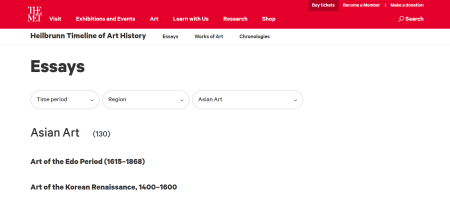ACTIONS
- Protect and safeguard cultural and natural heritage
- Learning and educational opportunities
- Cultural participation/social inclusion
- Sustainable tourism
- Support research
- Employment (recruiting, training, safety)
- Energy consumption, greenhouse gas emissions
- Waste management and reduction
- Transport (forms of, energy use)
- Commercial activities including copyright and IP
- Governance and management
- Security, disaster preparedness, risk reduction
- External partnerships and collaborations
- Sign-post to other resource (database)
- Essays
Heilbrunn Timeline of Art History - Essays on Asian Art

Resources
Intended Audience
Professionals, researchers, scholars, students, any members of the general public who are interested in art history of Asia.
- Various individual contributors, edited by E. A. Weinfield and P. Mariani, The Metropolitan Museum of Art
This open access, easy-to-use online platform allows users explore thematically, chronologically, and geographically art history worldwide using MET collections.
Avaiable in
- English
SDGs LINKAGES
This user-friendly, free platform, covering various art forms and media, is useful for anyone who studies Asian art history, works with collections related to the vast continent of Asia, or who wishes to deepen his/her/their knowledge of art collections originated from Asia. Although no SDGs are mentioned in the resource, it generally helps address SDG targets 4.7 (appreciate cultural diversity), 10.2 (empowerment of irrespective of race, ethnicity, origin, religion), 11.4 (safeguard art and heritage collections), 16.10 (ensure public access to information), and 17.6 (enhance North-South international cooperation and access on knowledge-sharing).
Click on the SDG Target to discover Our Collections Matter indicators
-
Our Collections Matter indicators:
- Numbers of people in each type of programme drawing on collections from different demographic groups.
- Increases in numbers of people in each type of programme from different demographic groups.
- Proportion of people involved in such programmes in relation to overall audience size.
- Evidence that learners have acquired knowledge and skills to promote sustainable development.
-
Our Collections Matter indicators:
- Collections development to ensure that collections effectively meet the needs of all, irrespective of age, sex, disability, race, ethnicity, origin, religion or economic or other status.
- Number and proportion of educational and participatory programmes that promote participation irrespective of social or other status.
- Numbers and proportions of people making use of collections in relation to the demographic of the local population.
- Numbers and proportions of people involved in focused programmes aimed at promoting social, economic and political inclusion.
- Numbers and proportions of people from different demographic groups involved in decision-making processes relating to collections and collections-based institutions.
- Number and types of partnerships that build relationships with marginalized groups, individuals and communities.
-
Our Collections Matter indicators:
- Total expenditure (public and private) per capita spent on the preservation, protection and conservation of all cultural and natural heritage, by type of heritage.
- Plans, policies and procedures in place for the safe use of collections for a variety of purposes, protecting and safeguarding both collections and those who use them.
- Plans, policies and procedures in place for the identification, safeguarding and protection of cultural and natural heritage at risk.
- Collecting programmes in place to protect, safeguard and make use of cultural and natural heritage, addressing the needs of communities and stakeholders, and ensuring that collections can be an effective resource for sustainable development.
- Number and diversity of educational, awareness-raising, research programmes, and partnerships that aim to strengthen protection of cultural and natural heritage.
-
Our Collections Matter indicators:
- Adopt and implement constitutional, statutory and/or policy guarantees for public access to information.
- Plans in place, and plans implemented to enhance public access to information relating to collections.
- Plans in place, and plans implemented to support fundamental freedoms, in line with human rights, national and international agreements and legislation.
- Plans and procedures in place for public access to information relating to the operation and management of collections-based institutions.
- Complaint mechanism in place for public to use where public access to information and fundamental freedoms not supported or fulfilled.
-
Our Collections Matter indicators:
- Number and diversity of North-South, South-South and triangular co-operations and projects to support access to science, technology and innovation and enhance knowledge-sharing on mutually agreed terms.
